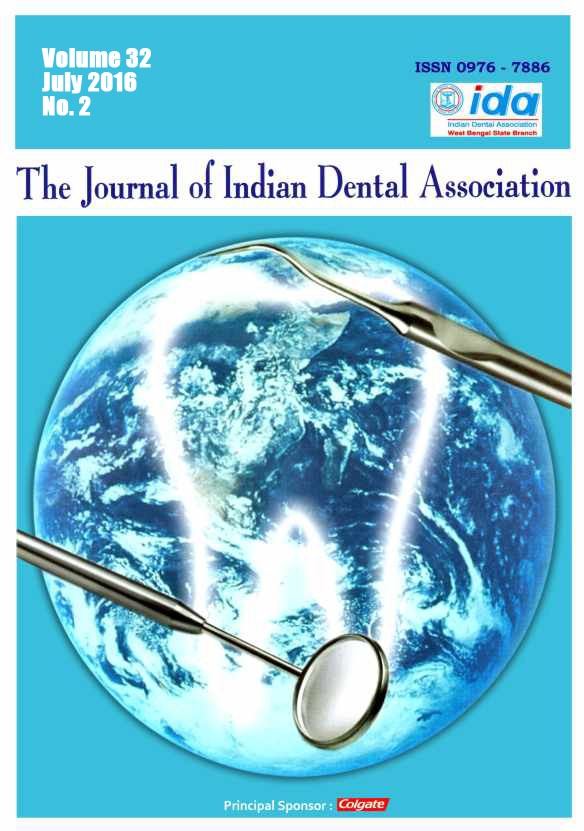Upcoming Events
1. Article Title.
2. Author Details.
3. Abstract.
4. Keywords.
5. Corresponding Author details.
July 2016
Volume : 32
No.: 2

Abstract: Dental treatment of pediatric patients is a challenging task for dental professionals. A sizable portion of pediatric dental patients are fearful in the dental settings. Fear of dentists keep them away from dental treatment. Pediatric patients often respond in a disruptive manner in the dental operatory. Behavior management of child dental patients is therefore an important section in pediatric dentistry. Nonaversive behavior management has become more important than pharmacological or restraining techniques.
Dr. Debolina Chowdhury,Dr. Priti Desai,Dr. Utpal Das,Dr. Antava Maity
Abstract: A tooth after non-surgical endodontic treatment needs an immediate post endodontic restoration to prevent it from fracture under occlusal load. After an endodontic treatment a tooth gets structurally compromised due to various factorslikeaccess cavity preparation and instrumentation, decreased dentinal moisture after endodontic treatment and presence of pre-existing carious lesion or fracture, trauma, parafunctional habits like bruxism, attrition etc. Failure rate of uncrowned or unrestored endodontically treated teeth is six times greater than that of coronally restored endodontically treated tooth. Most of the time a tooth can be restored as a full coverage crown or onlay after endodontic treatment depending on the amount of remaining tooth structure aftertreatment. Only full crown or onlay does not prevent horizontal fracture of tooth that occurs due to shear forces of mastication so many a times radicular support is taken to retain coronal restoration and strengthening of cervical region of tooth.In case of structurally compromised tooth cast post and core is provided to gain additional resistance to fracture. But many times it is not feasible to fabricate cast post in various clinical situation. Researchers are developing newer methods to improve function of tooth and restoration in such cases. Among them one is sharonlay. Sharonlay is an onlay design where a post extends from onlay into the radicular portion of the tooth providing cervical reinforcement against horizontal forces acting at cervical region.
Dr. Shyamal Maity,Dr. Supriya Banerjee,Dr. Deepashree Paul,Dr. Prof. Gautam Kundu,Dr. Shabnam Zahir,Dr. Amitava Bora
Abstract: Avulsion of tooth is the total displacement of a tooth from a socket. Has a prevalence of 0.5-3% among all dental injuries1. Hank's balanced salt solution can preserve periodontal ligament cells in vitro for 120 hours (5 days) and in vivo for 96 hours (4 days). This is one of the best solutions for the storage of avulsed teeth, because it does not need refrigeration, it has two years of shelf-life and it has been recommended and used with success for clinicians and researchers. Due to minimal side effect and maximum health benefit, many natural products such as Tender coconut water, Green tea extract, Aloevera, Long Shelf Life Honey Milk, MorusRubra, Salvia officinalis and recently Pomegranate Juice, Soymilk can also be used.
Dr. Uttam Sen,Dr. Arindam Karmakar,Dr. Ankan Maji,Dr. S. L. Das,Dr. Satyaki Das,Dr. Sanjoy Das,Dr. Sourav Saha
Abstract: Prosthodontic management of a patient with velopharyngeal defect is a challenge. In cases where surgery is not possible or where cleft palate is assoiciated with speech distortions, the use of a velopharyngeal obturator is recommended. These defects sometimes cause hypernasality, denasality, accumulation of food, and speech distortions. Speech therapy may also be required in some cases. Individuals with cleft lip, cleft palate or velopharyngeal dysfunction or combination of all may also demonstrate above mentioned errors. Obturation attempts to re-establish velopharyngeal closure, control of nasal emission during speech, and assist in preventing nasal regurgitation of food and fluids during swallowing. This case report presents a patient having cleft of the soft palate and velopharyngeal in sufficiency. Prosthodontic management is done by fabrication of a velopharyngeal obturator. Our aim was to obturate the defect and assess speech related defects and recommend for thespeech therapy wherever needed, thus providing success to the prosthesis.
Dr. U. K. Das,Dr. Aditya Mitra,Dr. Jagori Sarkar
Abstract: The mandibular first molar is one of the most important pillars of the dental arch. Being one of the earliest teeth to erupt it gives the maximum support to the dental arch. The tooth usually has lot of variation in the number of roots and root canals. One rare aberration associated with first molars is the presence of a third root with four root canals (Mesiobuccal, mesiolingual, distobuccal, distolingual canals). A case report of an 18 year old patient diagnosed with apical periodontitis secondary to carious pulpitis associated with left mandibular first molar presented with such an anomaly in the root and root canal configurations. It was managed by endodontic treatment, post and core followed by porcelain fused to metal crown .
Abstract: Multiple natal and neonatal teeth are rare clinical conditions and become rarest when it encountered in a prematurely delivered baby. This paper documented a rarest case of multiple natal teeth (bilateral maxillary molars and mandibular central incisors) in a prematurely delivered (seven and half month) baby (boy) whom we examined in a NICU where he was admitted since birth. A fine blend of Scientific knowledge and clinical experience of the clinician as well as parents consent are very useful to tackle this kind of case.
Dr. Arindam Karmakar,Dr. Uttam Sen,Dr. Ankan Maji,Dr. S. L. Das,Dr. Sourav Saha,Dr. Satyaki Das,Dr. Sanjoy Das
Abstract: The most challenging area in implantology is placement of implants in maxillary anterior region where missing teeth are to be replaced for esthetic demands. Loss of teeth in these areas causes bone resorption and collapse of gingival architecture, hence leading to aesthetic compromise and inadequate bone for implant placement. Paradigm shift in treatment protocol helps us to answer such aesthetic concerns. Placement of implants immediately into fresh extraction socket reduces the treatment time and cost, preserves the gingival architecture and increases the confidence of the patient. Here, a case report has been presented in which immediate extraction is done in maxillary anterior region followed by placement and early loading of an implant.
Dr. Subhasish Burman,Dr. Swapan Mazumder
Abstract: Defects both functional and aesthetic in maxillofacial region can caused by various ailment like developmental, infection, trauma, neoplasm and iatrogenic caused. Though reconstructions of these defects with free flap is gold standard, several hindrance such as surgical expertise, duration of surgery, equipments and increased cost associated with microvascular surgery, compliance of the patient make nonvascular bone graft a feasible choice for reconstructions of such defects. In the present case report reconstruction of segmental defect of mandible measuring 6cm due to removal of a tumor in posterior mandibular region is done.
Dr. Binayak Saha,Dr. Kuntal Chowdhury,Dr. Amrita Ghosh
Abstract: Aberrant root canal morphology in multi-rooted teeth is a constant challenge for diagnosis and successful endodontic treatment. Presence of extra canals, lateral canals and deltas are commonly encountered. Modifications in endodontic access and detection techniques along with advancement in illumination and magnification technology have aided in location of and treatment of extra canals in teeth. Case reports illustrating the endodontic treatment of maxillary first molar tooth with complex root canal system exhibiting canals i.e. MB1, MB2, DB & two Palatal canals are presented here.












